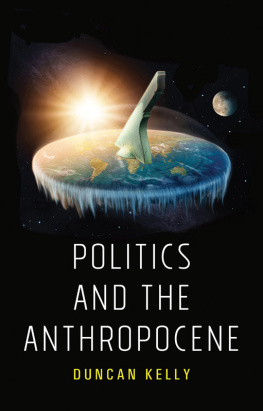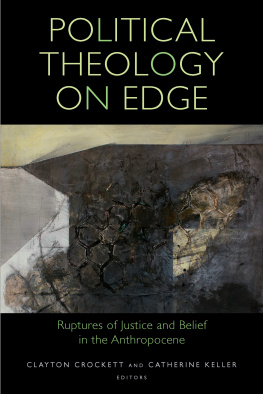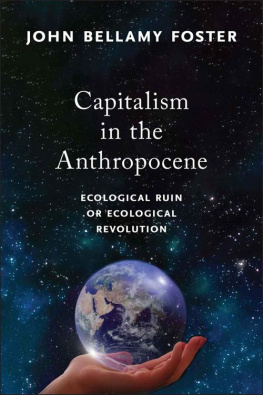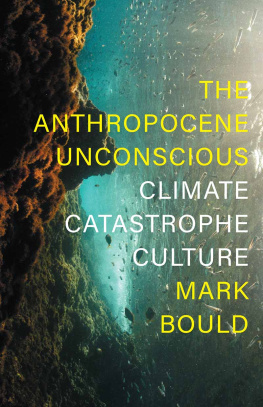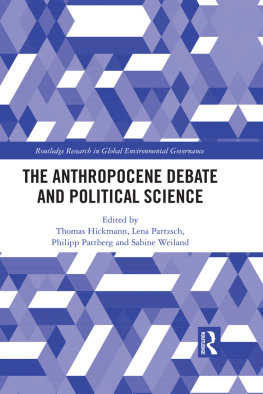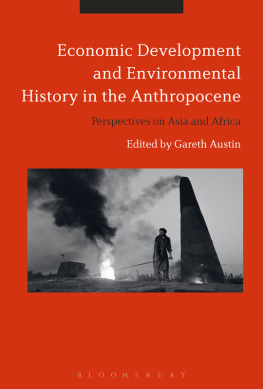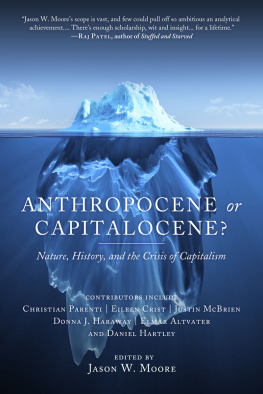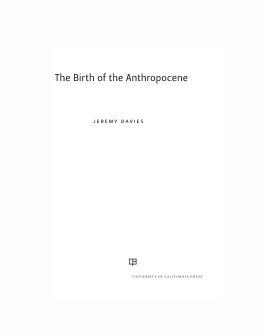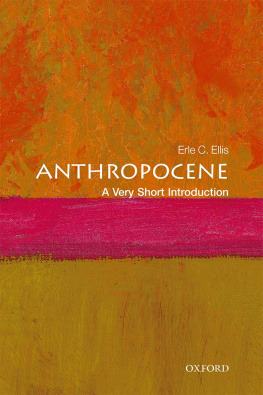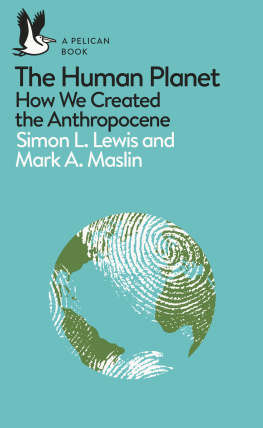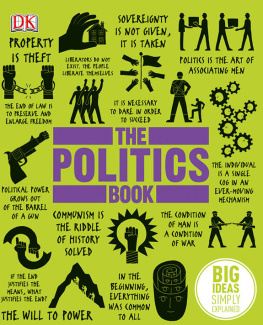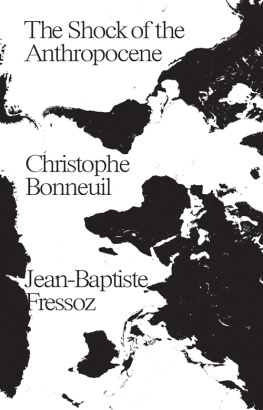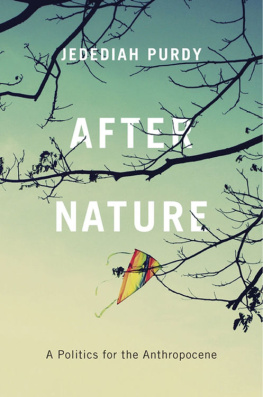
Politics and the Anthropocene
Duncan Kelly
polity
Copyright page
Copyright Duncan Kelly 2019
The right of Duncan Kelly to be identified as Author of this Work has been asserted in accordance with the UK Copyright, Designs and Patents Act 1988.
First published in 2019 by Polity Press
Polity Press
65 Bridge Street
Cambridge CB2 1UR, UK
Polity Press
101 Station Landing
Suite 300
Medford, MA 02155, USA
All rights reserved. Except for the quotation of short passages for the purpose of criticism and review, no part of this publication may be reproduced, stored in a retrieval system or transmitted, in any form or by any means, electronic, mechanical, photocopying, recording or otherwise, without the prior permission of the publisher.
ISBN-13: 978-1-5095-3419-7
ISBN-13: 978-1-5095-3420-3 (pb)
A catalogue record for this book is available from the British Library.
Typeset in 10.5 on 12 pt Sabon
by Fakenham Prepress Solutions, Fakenham, Norfolk NR21 8NL
Printed and bound in Great Britain by TJ International Limited
The publisher has used its best endeavours to ensure that the URLs for external websites referred to in this book are correct and active at the time of going to press. However, the publisher has no responsibility for the websites and can make no guarantee that a site will remain live or that the content is or will remain appropriate.
Every effort has been made to trace all copyright holders, but if any have been overlooked the publisher will be pleased to include any necessary credits in any subsequent reprint or edition.
For further information on Polity, visit our website: politybooks.com
Acknowledgements
I wrote a first draft of this book during the late summer to early autumn of 2018, when the reality of global climate catastrophes and their uneven effects were a continuous presence. Seeing cataclysmic floods, tsunamis, wildfires and mudslides makes it very tempting to succumb to a basic fatalism about the capacity of politics to do anything meaningful in the face of such awesome natural power, or to an almost apocalyptic, dystopian fear for the future. Both responses might be justified, but if they are, they dont help much if what youre interested in is trying to see what your own research in my case, the study of political thought and its intellectual history might have to say about any of this. Yet surrounding these discussions of climate change and climate crisis, once you scratch beneath the surface a little, is a term of art that has been discussed for some time by specialists, but which remains still a bewildering one for a student of political thought and intellectual history to get a grip on. That concept is the Anthropocene, and its central suggestion is that human action has ineradicably changed the environment such that now it is impossible to say where nature might begin and human action could end, so deeply intertwined are they. That makes it an eminently political problem.
My hope, in the brief compass of this book, is to try to show what sort of a perspective on the Anthropocene might be offered from the modern history of political and economic thinking, in ways that suggest something different from the wide variety of books already out there. And this is a book I would not have tried to write had it not been for the intense and intensely rewarding experience of teaching and working in the Department of Politics and International Studies at the University of Cambridge and of being a Fellow at Jesus College, Cambridge. My views about politics and political thinking have been profoundly reshaped over twelve years by my engagement with friends, colleagues and students here too numerous to mention. But for their specific help, support, advice, conversation, criticism and encouragement at various times over the short period of this particular project, and for pressing me always to try to be clearer about what I want to say about the Anthropocene, I am very grateful to those who have engaged with me directly, particularly Laura Daz Anadn, Alison Bashford, Duncan Bell, Adam Branch, Stefan Collini, Shailaja Fennell, Jeremy Green, Hester van Hensbergen, Anton Jger, Emma Mackinnon, Vronique Mottier, Renaud Morieux, David Nally, David Runciman and Helen Thompson. I also would not have had the temerity to begin writing on the subject had I not been fortunate to teach a seminar on the Anthropocene to sharply critical groups of MPhil students during early 2018 and 2019. Their willingness to think creatively about the issues really helped me to think about how this might be structured and argued. I am very grateful to them, as I am to my copy-editor, Justin Dyer, to Dave Prout for producing an index, and my editor, George Owers, someone whom I have known for over a decade, but with whom I have not worked directly on a book project before. His editorial interest and patience with my delays, and the (sometimes painfully) acute readers he commissioned to read through a still rather uncertain first draft, have been really helpful. Most of all, though, I remain grateful for the continued love and support of my partner, Rachel, and our son, Felix, to whom I dedicate this book.
Cambridge, UK
March 2019
Prologue
The New Political Times of the Anthropocene
The Anthropocene emerged as a concept within the fields of geological, atmospheric and planetary science. It did so as a direct response to the very obvious changes in climate that have transformed the ecology of planet Earth, and it affirmed that these changes have been significantly brought about by human activity. Putting human agency at the centre of geological and ecological transformation is at the forefront of debates about what the Anthropocene might mean, even if, at its most basic, the concept posits a deep and mutual interconnection between human activity and what was once called the natural environment. In this way, the Anthropocene is a concept for a world after nature, to the extent that it presupposes no distinction between human action and the natural world. Everything is connected in the age of the Anthropocene, an age that is said to follow from the relatively stable and temperate Holocene era of the last twelve thousand years. However, there is no scientific consensus about whether or not a new geological epoch exists, with clear stratigraphic markers in the multiple physical layers of earth, that could signify its emergence. Because of this, the Anthropocene remains a conceptual work in progress, argued about by human beings who are, in what is also taken to be indicative of the novel age of the Anthropocene, the first species to be self-consciously aware of their power in having transformed the earth. It is argued over too, because there is simply no way that such a transformative conceptual construction could ever plausibly seek universal assent. Concepts about the nature of human action are contested, and therefore straightforwardly political. They are always subject to deep disagreement.
This is a book on what some ways of thinking about the Anthropocene might mean for how we think of modern politics, and it approaches this question primarily from the perspective of the history of modern political theory. By so doing, I begin with an account of how the time-frames through which we understand the Anthropocene and modern politics might, and might not, intersect. From there, my argument considers the ways in which the various timescapes of Anthropocene time and political time pivot around several shared axes that have shaped the conceptual evolution of the Anthropocene. These cluster around energy and economic growth, population and inequality, indebtedness and questions of value. Tracing these overlapping concerns across the various generational time-frames through which each is configured, I suggest that the challenges of the Anthropocene for modern politics are twofold. In conventional terms, the Anthropocene forces politics to be more overtly ecological. By recognizing the deep interconnection between human action and the wider environment, the continued greening of business, politics and policy, as well as the sorts of things debated at the level of the Intergovernmental Panel on Climate Change (IPCC), we can continue to pragmatically respond to climatic changes and allow for incremental planning into the future. A more radically Anthropocened sense of politics, however, challenges the way in which we frame the terms of our engagement in the first place. For it suggests that in order to understand the ways in which our politics has come to be formed, we need to rewrite its terminology, its concepts, and thus its history, to show the interconnections between nature and the artificial world of politics. And if this is done, then it suggests the need to seriously critique our conventional thinking in relation to political values, economic limits, population growth and the nature of unevenly distributed ecological indebtedness. The challenge posed by the Anthropocene for modern politics is as much a radically humanistic one, that is to say, as it is a scientific or geological one.
Next page
